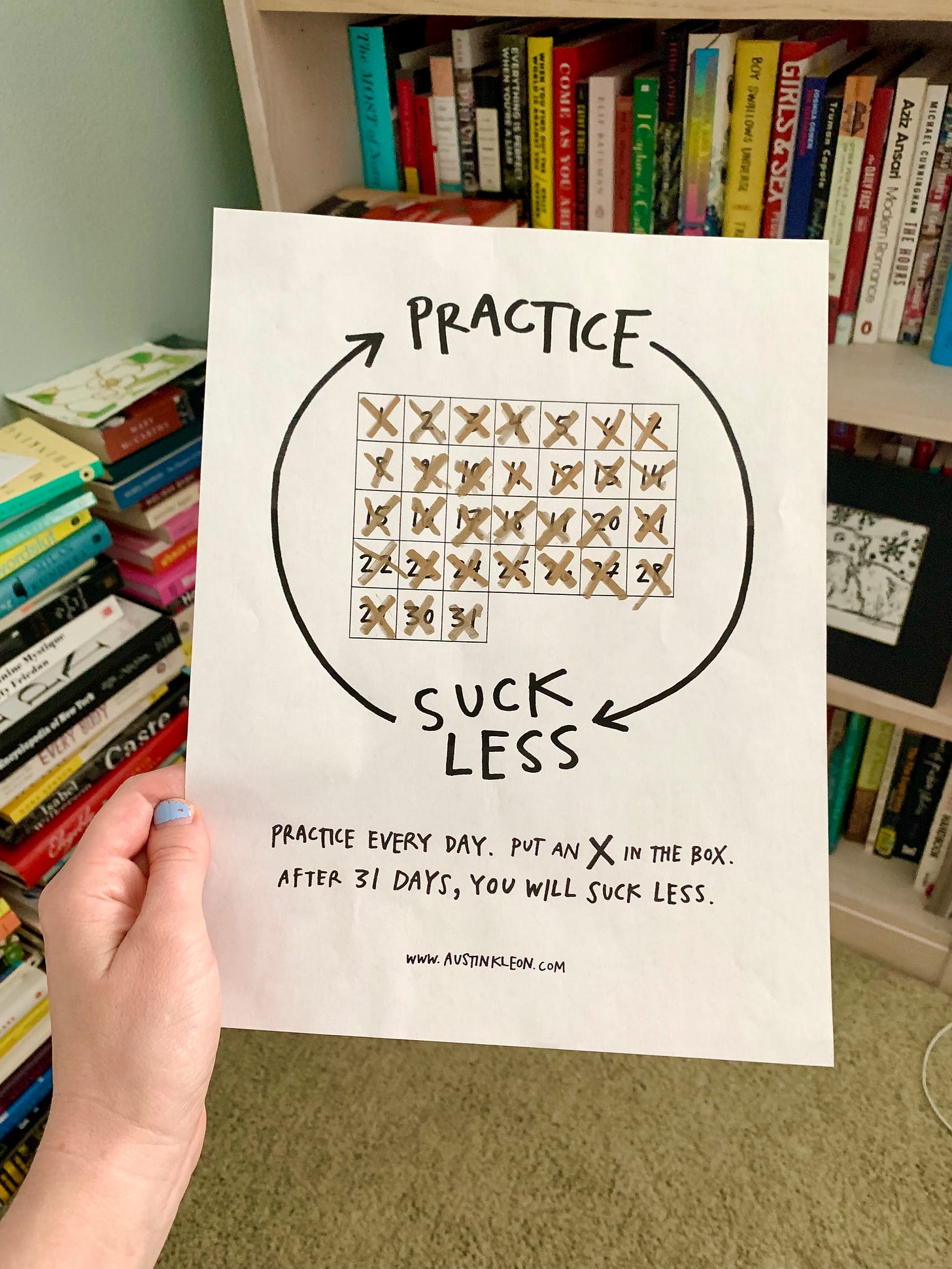#14: Artificial Brainstorm
What happens when we outsource our problems to technology in the pursuit of perfection?
Google has a new AI tool for “rappers, writers, and wordsmiths.” TextFX, created in collaboration with rapper Lupe Fiasco, is powered by Google’s PaLM 2 Large Language Model. It’s referred to as an “instrument” to help “explore the universe of possibilities” during the writing process.
The TextFX team is very consciously positioning the product as a facilitator for creativity. Definitely NOT a replacement for human work and ingenuity, nuh-uh no way, how dare you accuse them of that. The branding is especially interesting to me. Visually it’s far removed from Google’s approachable and user-forward primary colors, interface, and language. It’s probably one of the only visual identities in recent memory where the (overly-prominent tbh) coupling of thin, literary serif and futuristic monospaced typefaces actually makes sense—the writer steeped in tradition + the computer engineer embracing innovation. The individual tools are labeled ambiguously, words like FUSE, EXPLODE, and UNEXPECT. If you told me AI designed the site based on trending aesthetics, I’d believe you.
I played around with the tools for a while, ultimately underwhelmed by the output. I won’t employ it in my own writing and can’t imagine more accomplished writers will find it useful beyond the initial novelty. Still, I felt… not good about its existence.
In the introductory video, Fiasco discusses his participation in the creation of TextFX and bringing his two decades of writing experience to the project. In preliminary meetings he walked engineers through his process, how he uses word associations and prompts to spark inspiration when he hits a wall. My internal Luddite Alarm went bonkers. Writer’s block, for all its discouragement, is a rite of passage. A beautiful hindrance that can only be overcome by thinking and feeling and observing and experiencing. AI here feels like an unearned shortcut.
One of TextFX’s tools (“UNFOLD”) slots a word into other words or phrases. Typing “star” into the prompt bar produced star-crossed lovers, star trek, star-studded cast, star gazer, starving artists, starving student, star-shaped, and starving for attention in under five seconds. My 60 second (timed) exercise yielded starfish, starry night, fits and starts, stars in her eyes, sheriff badge, start your engines, starch, starboard, stark contrast, gold star. Equally valid lists, yet my brain—my entire body, actually—was much more engaged with my pen-and-paper brainstorming. There was an entirely different (re: more fulfilling) creative energy in acting as both input and processor. Sheriff badge, for instance, does not contain the word “star,” but it is shaped like one. A valuable brainstorming addition thanks to human “error.”
Fiasco’s twenty years of writing experience are passively mentioned in the intro video as bonafides for the skeptical creatives. Let’s think of it a little differently. That’s two decades of lived experience. Fiasco is 41 years old, so really four decades of emotions, successes, failures, imagination, and knowledge that he brings to his lyrics. Four decades of hard won wisdom siphoned into a depository of artificial intelligence and we’re told those two things are… commensurate? We’re told to be astounded by AI’s capabilities. Its usefulness. Its efficiency. What bothers me isn’t AI’s absorption of others’ work. It’s the idea that the sum is greater than its parts. Especially when its parts are infinitely more interesting and complex.
I always understood why ethics were relevant to discussions of AI. Plagiarism, the automation and displacement of human work, etc. Until recently, I saw AI as the pursuit of productivity, a means of circumventing laziness or roadblocks. A problematic ideology in its own right, but one that made sense in our output-obsessed society. Using TextFX, a new, malicious thought occurred to me. What if AI and its champions are not so much concerned with maximizing efficiency, but rather, determined to eradicate the discomfort of human error? Which is to say, the discomfort of being human.
–––––
One of my friends got engaged last month to the most fun and thoughtful guy. Usually collected and preternaturally cool about things, she admitted to being stressed the entire time. “It was your first time getting proposed to!” I joked “Next time you’ll be more relaxed.” I meant this to alleviate her anxiety—show me anyone who has fielded a proposition for lifelong commitment without needing an extra swipe of deodorant—but I also relished in the truth of this humor. We hold ourselves to impossibly high standards, yet we’re doing everything for the first time. Per my first newsletter: mistakes will be made! The only mistake we actually make is expecting anything to go perfectly.
I’ve slowly been telling more and more people about Left On Read. For three months I wrote letters without a direct audience. I was both the dialing and the receiving end of the call. When my mom recently looked through the archives, she found the welcome post from March 2021. “Sarah, is this a mistake? Why is this post from 2021?” I had to admit that I’ve wanted to write this newsletter since January 2021 and only found the courage to do so two years later with the encouragement of a mentor. Even then, I spent weeks between posts, critical of my own musings and contributions to the culture’s “newsletter fatigue.”
Then, two points of inflection. The first came in the form of writer Austin Kleon’s 31 Day Challenge in which he invites participants to pick something, anything, and then practice it every day. After 31 days, he promises “you will suck less.” This was, strangely, both the permission and the call to action that I needed. This newsletter wasn’t my job, there wasn’t an expectation to be a fully realized cultural critic from the jump. In fact, I hadn’t even written anything of substance since a series of writing workshops in 2018. So using this space as a little sandbox for my brain was actually very low stakes. I just wanted to practice and get a bit better.
The second point: the realization that newsletters are just blogs revisited. I often reminisce about my own cringey OOTD blogging journey circa 2011. Had I continued, would I have cycled through all the bad stuff and eventually found the interesting, creative, good stuff? Would I be in a different position today, artistically, if I hadn’t been so concerned with perfection? I robbed myself of 10 years of writing experience because I was fearful of not doing it the right way. The perfect way.
In many instances when we outsource our problems to technology, we perpetuate the belief that the human experience is less than. Writer’s block is unacceptable. Taking time to riddle out problems is unacceptable. Let technology do the heavy lifting, but leave us a semblance of agency so we still feel in control. Industrialization was supposed to save us time, creating space for rest and play. Instead, we straddled ourselves with more work. Today, automation has afforded us…. what exactly? More time on our phones, if most of us were honest.
Obviously AI and its media maelstrom show no signs of slowing down. I don’t think this is bad, necessarily! We need experiments, we need advancements. Tapping out or resisting change isn’t the answer. Fiasco, for his part, vehemently rejected Google’s initial proposal to create technology to write raps for him. Curious about the developing technology, he guided the project to serve his own needs. What will be critical as more opportunities like this arise is to keep measuring what we are gaining against what we are losing when we invite AI into our offices, labs, and writing workshops. There’s no substitute for manually doing the work, however imperfect and mistake-ridden it may be, even if AI advocates tell us otherwise.
Sidewalk Reporting
Very excited about these flowers, which look straight out of Whoville.
–––––
Have a great weekend, friends! And in case you’re behind on Left On Reads, the archive is just this way :)








